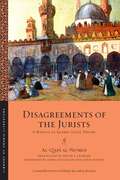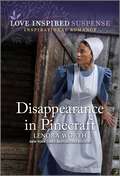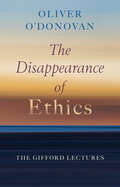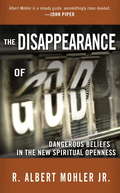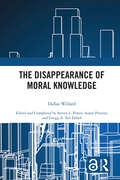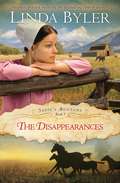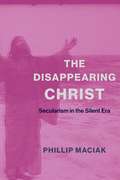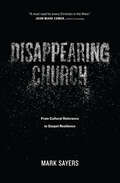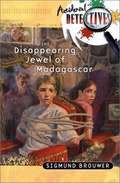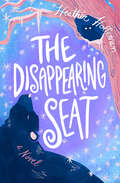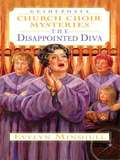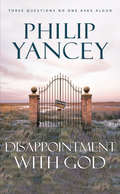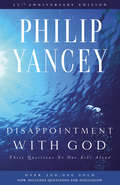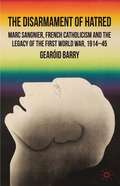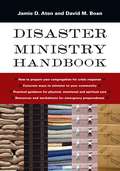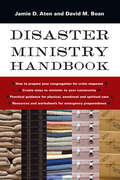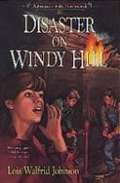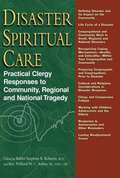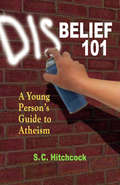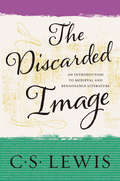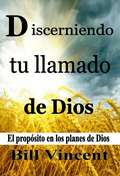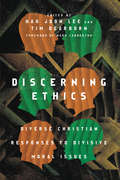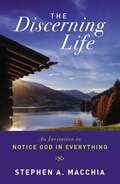- Table View
- List View
Disagreements of the Jurists: A Manual of Islamic Legal Theory (Library of Arabic Literature #22)
by al-Qāḍī al-NuʿmānA masterful overview of Islamic law and its diversityAl-Qadi al-Nu'man was the chief legal theorist and ideologue of the North African Fatimid dynasty in the tenth century. This translation makes available for the first time in English his major work on Islamic legal theory (usul al-fiqh), which presents a legal model in support of the Fatimid claim to legitimate rule.Composed as part of a grand project to establish the theoretical bases of the official Fatimid legal school, Disagreements of the Jurists expounds a distinctly Shi'i system of hermeneutics. The work begins with a discussion of the historical causes of jurisprudential divergence in the first Islamic centuries and goes on to engage, point by point, with the specific interpretive methods of Sunni legal theory. The text thus preserves important passages from several Islamic legal theoretical works no longer extant, and in the process throws light on a critical stage in the development of Islamic legal theory that would otherwise be lost to history.An English-only edition.
Disappearance in Pinecraft
by Lenora WorthHer sister has disappeared…and now her life is on the line.When Adina Maas arrives in Pinecraft to find her missing sister, she&’s blindsided by abductors who attempt to kidnap her. To her surprise, Nathan Kohr, a familiar face from her past, is there to save her. And it&’s clear that whatever trouble Adina&’s sister is in, Adina is now a target, too. But with Nathan&’s help, can they find out who&’s after the Maas sisters before Adina is the next to disappear?From Love Inspired Suspense: Courage. Danger. Faith.
The Disappearance of Ethics: The Gifford Lectures
by Oliver O'DonovanThe capstone lectures of esteemed ethicist Oliver O&’Donovan What is the future of ethics? Oliver O&’Donovan addresses a discipline in crisis in The Disappearance of Ethics. Based on the 2021 Gifford Lectures, this book contends that contemporary ethics has lost its object (good), frontier (time), and agent (person). O&’Donovan traces the development of these concepts from Greek philosophy through early Christianity, the Enlightenment, and into the modern era. Engaging with a range of thinkers including Aristotle, Augustine of Hippo, Max Scheler, Karl Barth, and more, O&’Donovan shows how ethics has lost its heart and how the field can regain its purpose. He completes his lectures by integrating theology and philosophy to recover ethics. Contemplating theological concepts such as creation, divine law, and justification undergirds ethics by generating &“existential wonder.&” With characteristic warmth and scholarly precision, O&’Donovan reinvigorates ethical argument with theological insight. Scholars and students of Christian ethics will find his lectures equally provocative and inspiring.
The Disappearance of God: Dangerous Beliefs in the New Spiritual Openness
by R. Albert Mohler"Great biblical truths are meant not only for our intellectual acceptance, but for our spiritual health." -Dr. Al Mohler. More faulty information about God swirls around us today than ever before. No wonder so many followers of Christ are unsure of what they really believe in the face of the new spiritual openness attempting to alter unchanging truth. For centuries the church has taught and guarded the core Christian beliefs that make up the essential foundations of the faith. But in our postmodern age, sloppy teaching and outright lies create rampant confusion, and many Christians are free-falling for "feel-good" theology. We need to know the truth to save ourselves from errors that will derail our faith. As biblical scholar, author, and president of The Southern Baptist Theological Seminary, Dr. Albert Mohler, writes, "The entire structure of Christian truth is now under attack." With wit and wisdom he tackles the most important aspects of these modern issues: Is God changing His mind about sin? Why is hell off limits for many pastors? What's good or bad about the "dangerous" emergent movement? Have Christians stopped seeing God as God? Is the social justice movement misguided? Could the role of beauty be critical to our theology? Is liberal faith any less destructive than atheism? Are churches pandering to their members to survive? In the age-old battle to preserve the foundations of faith, it's up to a new generation to confront and disarm the contemporary shams and fight for the truth. Dr. Mohler provides the scriptural answers to show you how.
The Disappearance of Moral Knowledge
by Dallas WillardBased on an unfinished manuscript by the late philosopher Dallas Willard, this book makes the case that the 20th century saw a massive shift in Western beliefs and attitudes concerning the possibility of moral knowledge, such that knowledge of the moral life and of its conduct is no longer routinely available from the social institutions long thought to be responsible for it. In this sense, moral knowledge—as a publicly available resource for living—has disappeared. Via a detailed survey of main developments in ethical theory from the late 19th through the late 20th centuries, Willard explains philosophy’s role in this shift. In pointing out the shortcomings of these developments, he shows that the shift was not the result of rational argument or discovery, but largely of arational social forces—in other words, there was no good reason for moral knowledge to have disappeared.The Disappearance of Moral Knowledge is a unique contribution to the literature on the history of ethics and social morality. Its review of historical work on moral knowledge covers a wide range of thinkers including T.H Green, G.E Moore, Charles L. Stevenson, John Rawls, and Alasdair MacIntyre. But, most importantly, it concludes with a novel proposal for how we might reclaim moral knowledge that is inspired by the phenomenological approach of Knud Logstrup and Emmanuel Levinas. Edited and eventually completed by three of Willard’s former graduate students, this book marks the culmination of Willard’s project to find a secure basis in knowledge for the moral life.
The Disappearances: Another Spirited Novel By The Bestselling Amish Author! (Sadie's Montana #3)
by Linda BylerSadie may be married now, but she's as spirited as ever, and her life is no less tame. In fact, soon after she and Mark are settled into the farmhouse which Mark is renovating, she's visited by three FBI agents who question her about the two children who mysteriously appeared one day at the Ranch. Before the agents leave, they warn Sadie that her beloved horse, Paris, is highly valuable, and that she and Mark may be in grave danger because of Paris. This news, on top of Mark's unexpected black moods, leaves Sadie sometimes wishing she could go home, "lay her head on Mam's shoulder, and ask why she hadn't warned her. " But when Sadie is kidnapped at gunpoint by two men in ski masks, her stubborn strength is tested beyond her imagining. Mark disappears emotionally without warning. Now Sadie has disappeared, leaving Mark and her family wracked with worry. And Anna, Sadie's youngest sister, desperate for Neil Hershberger's attention, refuses to eat, plagued by an eating disorder as she fades away. And yet, Mark's younger brother Timothy appears, bringing unexpected life and hope to the family. Mercifully, healing and courage reappear in unexpected times and places in this concluding volume of the Sadie's Montana series.
The Disappearing Christ: Secularism in the Silent Era
by Phil MaciakAt the turn of the twentieth century, American popular culture was booming with opportunities to see Jesus Christ. From the modernized eyewitness gospel of Ben-Hur to the widely circulated passion play films of Edison, Lumière, and Pathé; from D. W. Griffith’s conjuration of a spectral white savior in Birth of a Nation to W. E. B. Du Bois’s “Black Christ” story cycle, Jesus was constantly and inventively visualized across media, and especially in the new medium of film. Why, in an era traditionally defined by the triumph of secular ideologies and institutions, were so many artists rushing to film Christ’s miracles and use his story and image to contextualize their experiences of modernity?In The Disappearing Christ, Phillip Maciak examines filmic depictions of Jesus to argue that cinema developed as a model technology of secularism, training viewers for belief in a secular age. Negotiating between the magic trick and the documentary image, the conflicting impulses of faith and skepticism, the emerging aesthetic of film in this period visualized the fraught process of secularization. Cinematic depictions of an appearing and disappearing Christ became a powerful vehicle for Americans to navigate a rapidly modernizing society. Studying these films alongside a multimedia, interdisciplinary archive of novels, photographs, illustrations, and works of theology, travel writing, and historiography, The Disappearing Christ offers a new narrative of American cultural history at the intersection of cinema studies and religious studies.
Disappearing Church: From Cultural Relevance to Gospel Resilience
by Mark SayersWhen church and culture look the same...For the many Christians eager to prove we can be both holy and cool, cultural pressures are too much. We either compartmentalize our faith or drift from it altogether—into a world that&’s so alluring.Have you wondered lately:Why does the Western church look so much like the world? Why are so many of my friends leaving the faith?How can we get back to our roots?Disappearing Church will help you sort through concerns like these, guiding you in a thoughtful, faithful, and hopeful response. Weaving together art, history, and theology, pastor and cultural observer Mark Sayers reminds us that real growth happens when the church embraces its countercultural witness, not when it blends in.It&’s like Jesus said long ago, &“If the salt loses its saltiness, it is no longer good for anything…&”
Disappearing Church: From Cultural Relevance to Gospel Resilience
by Mark SayersWhen church and culture look the same...For the many Christians eager to prove we can be both holy and cool, cultural pressures are too much. We either compartmentalize our faith or drift from it altogether—into a world that&’s so alluring.Have you wondered lately:Why does the Western church look so much like the world? Why are so many of my friends leaving the faith?How can we get back to our roots?Disappearing Church will help you sort through concerns like these, guiding you in a thoughtful, faithful, and hopeful response. Weaving together art, history, and theology, pastor and cultural observer Mark Sayers reminds us that real growth happens when the church embraces its countercultural witness, not when it blends in.It&’s like Jesus said long ago, &“If the salt loses its saltiness, it is no longer good for anything…&”
The Disappearing Jewel of Madagascar
by Sigmund BrouwerFriends Become Strangers, and Strangers Become Friends.... When Ricky Kidd first hears about the curse of the Jewel of Madagascar, he is pretty sure he doesn't believe in it. But almost immediately, strange things start happening. First he knocks over a statue that crushes part of Mrs. McEwan's antique jewelry collection. Ricky is convinced his life is over--paying off the debt will take years! As if that weren't bad enough, all of his friends seem to be deliberately avoiding him. And then there is Mrs. McEwan's mysterious nephew--Ricky is sure he is not who he seems. Can the curse be coming true? As Ricky struggles to make sense of everything, he learns the importance of friends, trust, and loyalty. WHO IS STEALING MRS. MCEWAN'S JEWELRY? WHY ARE RALPHY AND MIKE AVOIDING RICKY? WHAT ON EARTH DOES EATING WORMS HAVE TO DO WITH ANYTHING?
The Disappearing Seat: Elita Brown Book #2 (The Elita Brown Series)
by Heather HollemanBook 2 in the Elita Brown series.December normally brings joy to Elita Brown&’s heart with the coziness of winter and the anticipation of Christmas. But when Elita compares her life to others, her best friends seem to have it so much better. Margo hosts a fancy holiday dinner party; Joy discovers a hibernating bear on her family&’s property, and Stephen shares his love of football with Joy. Even her little sister Cally has a seemingly perfect life with a special role in The Nutcracker. Every day, Elita grows more and more jealous.To make matters worse, the principal of Siler Middle School insists on a school-wide speech competition. Can Elita get over her fear of public speaking? How can her jealous heart heal? And where is her mentor Mrs. Burgley when she needs her most of all?In The Disappearing Seat, Elita discovers the secret to savoring the good gifts all around her. Through the wisdom revealed in nature and a loving spiritual mentor, Elita learns what it means to have access to the riches of God&’s kingdom and how to enjoy the beautiful life God has given her. Readers will delight in what they learn about the bears, owls, and the frozen vernal ponds in the Pennsylvania forest (which all become symbols of Elita&’s spiritual growth). With great discussion questions included, this book helps young readers on their journey with Jesus.
The Disappointed Diva (Church Choir Mysteries #23)
by Evelyn MinshullThis is book 23 in the Church Choir Mysteries series.
Disappointment with God: Three Questions No One Asks Aloud
by Philip YanceyIs God Unfair? Is God Silent? Is God Hidden? These questions are asked with piercing honesty and biblical certainty. Step by step, Philip Yancey retraces the long journey toward understanding the answers to these and other questions. If God desires our love, why does he sometimes put obstacles in the way? Why does he seem so distant? What can we expect from him after all? No part of the Bible goes unstudied in the author's search for God's hidden nature in this compelling and profound book. A Gold Medallion Award winner, Disappointment with God has had an overwhelming impact on many lives -- it can change yours.
Disappointment with God: Three Questions No One Asks Aloud
by Philip YanceyPhilip Yancey has a gift for articulating the knotty issues of faith. In this 25th Anniversary edition of Disappointment with God, Yancey poses three questions that Christians wonder but seldom ask aloud: Is God unfair? Is he silent? Is he hidden? This insightful and deeply personal book points to the odd disparity between our concept of God and the realities of life. Why, if God is so hungry for relationship with us, does he seem so distant? Why, if he cares for us, do bad things happen? What can we expect from him after all? Yancey answers these questions with clarity, richness, and biblical assurance. He takes us beyond the things that make for disillusionment to a deeper faith, a certitude of God's love, and a thirst to reach not just for what God gives, but for who he is. Included in this anniversary edition is a study guide with questions about these perplexing questions of faith that the author confronts.
The Disarmament of Hatred: Marc Sangnier, French Catholicism and the Legacy of the First World War, 1914–45
by Gearóid BarryDocumenting an audacious Franco-German movement for moral disarmament, instigated in 1921 by war veteran and French Catholic politician Marc Sangnier, in this transnational study Gearóid Barry examines the European resonance of Sangnier's Peace Congresses and their political and religious ecumenism within France in the era of two World Wars.
Disaster Ministry Handbook
by Jamie D. Aten David M. BoanFEMA Community Preparedness Award When disasters happen, people turn to local churches as centers for response and assistance. When floods or tornadoes devastate an area, or when shootings and violence shock a community, knowing what to do can be the difference between calm and chaos, courage and fear, life and death. But few churches plan in advance for what they should do— until the storm hits. Don't get caught unprepared. If a natural disaster or human tragedy strikes your community, your church can minister to the hurting. Jamie Aten and David Boan, codirectors of the Humanitarian Disaster Institute, provide a practical guide for disaster preparedness. Disaster ministry is a critically important work of the church, preparing for the unthinkable, providing relief to survivors, caring for the vulnerable and helping communities recover. Filled with resources for emergency planning and crisis management, this book provides best practices for local congregations. By taking action in advance, your church can help prevent harm and save lives during a disaster. The time to plan is now. Be prepared.
Disaster on Windy Hill (Adventures of the Northwoods #10)
by Lois Walfrid JohnsonBook 10 in the Adventures of the Northwoods. When someone tries to steal Windsong, Kate is determined to find the would-be thief -- but at what cost to her family?
Disaster Spiritual Care: Practical Clergy Responses to Community, Regional and National Tragedy
by Willard W. C. Ashley Stephen B. RobertsThe first comprehensive resource for pastoral care in the face of disaster--a vital resource for clergy, seminarians, pastoral counselors and caregivers of all faith traditions. This essential resource for clergy and caregivers integrates the classic foundations of pastoral care with the unique challenges of disaster response on community, regional and national levels. Offering the latest theological perspectives and tools, along with basic theory and skills from the best disaster response texts, research and concepts, the contributors to this resource are innovators in their fields and represent Christianity, Judaism, Islam and more. Exploring how spiritual care changes following a disaster, and including a comprehensive explanation of a disaster's lifecycle, this is the definitive guidebook for counseling not only the victims of disaster but also the clergy and caregivers who are called to service in the wake of crisis.
Disaster Status
by Candace CalvertA hazardous material spill means ER charge nurse Erin Quinn and fire captain Scott McKenna must work together, even though they don't seem to agree on much of anything.
Disbelief 101: A Young Person's Guide to Atheism
by Tom Flynn S. C. HitchcockFilled with wit, humor, and clear metaphor, this exploration into atheism is written specifically for young adults, though any adult interested in learning more about atheism will find value within. Not just focused on atheism, this crash course in logical thinking addresses the issues of indoctrination, whether it be religious, political, or commercial, and makes the case that morality is created through reasoning and logic, not through divine communication. Many hot topics are touched upon, such as traditional arguments for God’s existence, the relationship of evolution and religious belief, the incompatible nature of science and religion, and the harmfulness of both Christianity and Islam.
The Discarded Image: An Introduction to Medieval and Renaissance Literature
by C. S. LewisIn The Discarded Image, C.S. Lewis paints a lucid picture of the medieval world view, providing the historical and cultural background to the literature of the Middle Ages and Renaissance. It describes the "image" discarded by later years as "the medieval synthesis itself, the whole organization of their theology, science and history into a single, complex, harmonious mental model of the universe." This, Lewis's last book, has been hailed as "the final memorial to the work of a great scholar and teacher and a wise and noble mind."
Discerniendo tu llamado de Dios: El propósito en los planes de Dios
by Bill VincentDiscerniendo tu llamado de Dios El propósito en los planes de Dios Todos tenemos un llamado de Dios, pero necesitamos discernirlo. El llamado de Dios es más que solo una posición en la iglesia. En este libro instructivo: Discerniendo el llamado de Dios, comenzaré compartiendo dos claves principales que te ayudarán a liberarte y entrar de lleno a tu destino. Tendrás un renovado entusiasmo para continuar tu viaje al centro de los propósitos de Dios para tu vida. Las mentiras del enemigo quedarán rotas a medida que descubras el gran deseo de Dios de que acabes la carrera que él ha puesto delante de ti, tu llamado de lo alto, con gozo y excelencia. Compartiré acerca del meollo de tres claves que son más importantes; claves que te pondrán en una buena posición para discernir tu llamado. Noche y día, calor o frío, arriba y abajo, dar y tomar, muerto y vivo. ¡Oye! ¿Qué tienen en común todas estas frases? Adivinaste. Cada par ilustra opuestos. El llamado de Dios es más que solo una posición en la iglesia. En este libro instructivo: Discerniendo el llamado de Dios, Bill Vincent comienza compartiendo dos claves principales que te ayudarán a liberarte y entrar de lleno a tu destino. Tendrás un renovado entusiasmo para continuar tu viaje al centro de los propósitos de Dios para tu vida. Las mentiras del enemigo quedarán rotas a medida que descubras el gran deseo de Dios de que acabes la carrera que él ha puesto delante de ti, tu llamado de lo alto, con gozo y excelencia.
Discerning Ethics: Diverse Christian Responses to Divisive Moral Issues
by Tim Dearborn Hak Joon LeeRacism. Immigration. Gun violence. Sexuality. Health care.
The Discerning Life: An Invitation to Notice God in Everything
by Stephen MacchiaSpiritual discernment is a key theme in the Scriptures. From the Garden when Adam and Eve turned away from the simplest terms of a relationship with God, to the Garden when John the Apostle wrote the book of Revelation to a distracted people anticipating eternity, discerning God has been the heart of the matter. In modern times, however, we have forgotten the basic premise of practicing a preference for God, out of which we then are invited to live for God. Instead, we have implanted strategic planning, head-to-head battling, and will-of-God knowing in its place. In The Discerning Life, Stephen A. Macchia seeks to upend the one-eyed and limited Christian understandings of spiritual discernment and invite readers and leaders to reconsider how they prioritize the care of their souls, the grace of their communities, and the mission of their lives, churches, and organizations. When we have a fuller understanding of how spiritual discernment matters to the whole of our lives, we will in turn encourage others to follow likewise and then lean fully into the mission, mandate, and message of the whole counsel of God.
